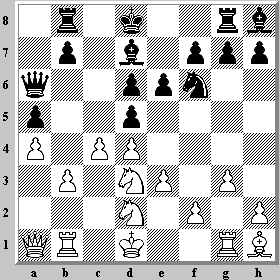13) Fischerandom chess game between Bronstein and Douven. Tom Furstenberg reports: IGM David Bronstein - IM Rudi Douven. This game was played on the 1st board during a friendly match on 30 boards between Chess Club Anderlecht of Belgium vs. Eindhovense Schaakclub of The Netherlands on 30.06.96. The time limit used was 1 hour 45 minutes for the first 40 moves, thereafter 15 minutes for the rest of the game.
The initial position for this game of Fischerandom Chess was White: Kd1, Qa1, Rb1, Rg1, Be1, Bh1, Nc1, Nf1. Black: Kd8, Qa8, Rb8, Rg8, Be8, Bh8, Nc8, Nf8
1.d4 d5 2.Nd3 Nd6 3.g3 e6 4.Bb4 a5 5.Bxd6 cxd6 6.a4 Qa6 7.Nd2 Nd7 8.b3 Nf6 9.c4 Bd7 10.e3 0-0 (The black King goes to g8 and the black Rook to f8) 11.Ke2 g6 12.Rgc1 Rfe8 13.Qa3 e5 14.dxe5 dxe5 15.b4 e4 16.Nc5 Bg4+ 17.Ke1 Qd6 18.cxd5 Qxd5 19.bxa5 Qh5 20.h4 Bf5 21.Nxb7 Qg4 22.Bg2 Nh5 23.Nf1 Be6 24.a6 Be5 25.Nh2 Qf5 26.Nd6 Bxd6 27.Qxd6 Qa5+ 28.Kf1 Rxb1 29.Rxb1 Rd8 30.Rb8 Bc8 31.Rxc8 Rxc8 32.Bxe4 Qxa4 33.Bb7 Rc2 34.Qb8+ Kg7 35.a7 Nxg3+ 36.Kg2 Nf5 37.a8Q Nxe3+ 38.Kf3 Rxf2+ 39.Kxf2 Nd1+ 40.Kg3 Qb3+ 41.Bf3 Black Resigns. [TWIC 90, 7 July 1996]
This was followed by the game in PGN format, where Crowther commented, 'Of course I've had to split the game in two because of the castling.' Of course! Even today, 13 years later, there is much chess software that doesn't understand chess960.
When I read Crowther's report, my first reaction to the initial position was 'That can't be right!', because the King was not placed between the two Rooks. Then I realized that Crowther had listed the pieces in order of value (KQRRBBNN), rather than in order of board position (QRNKBNRB). For reasons that I'll give some other time, the order by value is my preferred method of setting up a chess960 start position.
The start position QRNKBNRB is no.491 (SP491). After White's 10th move, the players reached the following position.
R.Douven
D.Bronstein
(After 10.e2-e3)
Now Black castled 10...O-O (Crowther: 'The black King goes to g8 and the black Rook to f8') and White played 11.Ke2. Here the game starts to look very much like a traditional chess game, except for the Black Bishop buried on h8. After 11...g6, even that difference fades into the game score.
Given the general lack of material about chess960, it's not surprising that there is very little on the web about the Bronstein - Douven game. Google locates David Bronstein herzien?, a Dutch review of a new (2009) edition of 'The Sorcerer's Apprentice' by Bronstein & Fürstenberg. That's the same Furstenberg who reported the game to TWIC in 1996.
Google also does a reasonable job of translating the book review, where we learn the reviewer's main objective: 'The question was whether the need is so new and expanded version. And to answer that question, go look for the differences.' That's a good question, because I have the 1995 edition of 'The Sorcerer's Apprentice', and I would also like to know what's new. It turns out that the chess960 portion of the review is:
And gives a lot Fürstenberg Bronstein - Douven, from a friendly game Anderlecht - Eindhoven, with random chess is played. The reader is warned of passing and the fact that Fischer Random is a derivative of an idea that Bronstein himself has invented twenty years earlier.
Perhaps not coincidentally, near the end of the 1995 edition is a brief Q&A passage explaining why Bronstein, a World Championship challenger in 1951, might have been attracted to chess960 in 1996:
Q: Classical chess appears to be in a state of crisis. • A: Because chess has already been studied so thoroughly. The aura of mystery has vanished! Today chess relies on the splendid memory of the young. They complain that they have to work hard, that our generation does not understand them, does not realize how difficult it is to digest thousands of games, commit a mass of information to memory, and not confuse the proper order of moves in reproducing a 20-move long variation on the board. I appreciate that this involves enormous physical and mental strain. But this has nothing in common with the chess that was played by my generation. (1995, p.289)
What about the statement that 'Fischer Random is a derivative of an idea that Bronstein himself has invented twenty years earlier'? That would also make a good subject for another post.

No comments:
Post a Comment